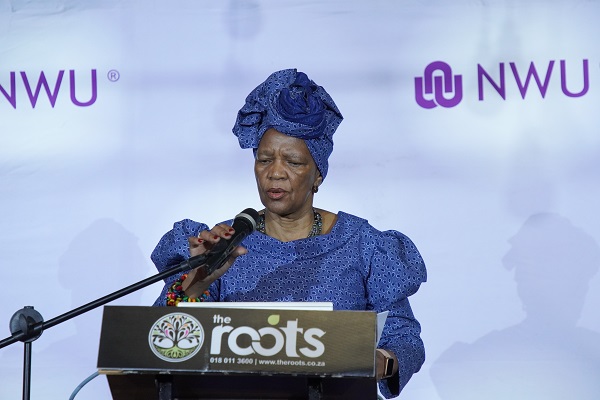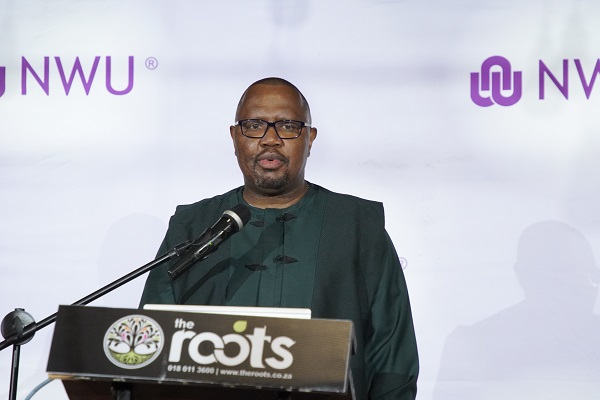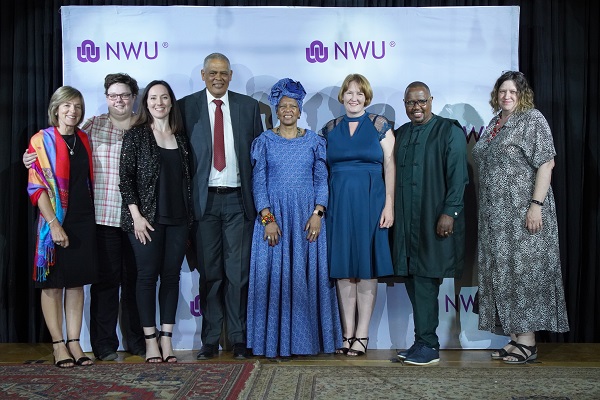On Friday, 20 October, the Faculty of Education at the North-West University (NWU) launched the Centre for Higher Education Professional Development (CHEPD), and the Centre for African Language Teaching (CALT) – Setswana.
Clad in a variety of African cultural attires, distinguished speakers and esteemed guests descended on the beautiful Roots Café in Potchefstroom to witness the inauguration of the two centres.
Whereas the CHEPD is a teaching-learning centre focusing on professionalising academics as higher-education teachers, the CALT is a research, teaching and learning centre with a focus on and dedication to the promotion, use and development of Setswana as one of the South African official languages.
According to Dr Dolly Dlavane, director of the CALT and a board member of the Pan South African Language Board (PanSALB), this is the first-ever centre for African language teaching with a special focus on strengthening literacy teaching and learning of Setswana in Setswana.
“We are standing at the birth of hope for the teaching, development and use of Setswana, which in total is the preservation of our Setswana language.”
In emphasising the core aim of the CHEPD, the director and National Research Foundation-rated (NRF-rated) researcher in Higher-Education Studies, Prof Emmanuel Mgqwashu, emphasised a focus on professionalising higher-education teachers for a responsive academy.
“To achieve this, the CHEPD will manage the development and offering of accredited formal and structured academic programmes to complement the continuous professional development (CPD) opportunities offered by the Centre for Teaching and Learning (CTL).”
Prof Willie van Vollenhoven, chief director of the CTL, said: “The CHEPD’s launch represents the introduction of a complementary centre. The centre will enhance a healthy collaboration between the CTL and the Faculty of Education, ensuring NWU academics are supported in their response to the imperatives facing a decolonising and transforming 21st-century higher-education context.”
Chrissie Boughey, Rhodes University emeritus professor of Higher-Education Studies and extraordinary distinguished professor at Stellenbosch University, indicated that “language” and “education” are the two phenomena that are taken for granted most often.
“Everyone has been exposed to ‘education’ and speaks a ‘language’, therefore commonsense ideas and assumptions about both have a detrimental impact on educational performance for many students in higher education.”
Prof Boughey furthermore said the establishment of the two centres provides hope because both promise to do research and produce formal credentials. These credentials will challenge the stereotyped attitudes on language and education that have been detrimental to educational equity in South Africa for decades.
Responding on behalf of the Department of Basic Education (DBE), particularly regarding the launch of the CALT, Dr Barney Mthembu said the NWU is on the right track.
"The DBE wants to encourage and permit students to use the language they most comfortably understand, and we feel honoured that we share similar goals with the NWU."
Mr Lance Schultz, the chief executive officer of PanSALB, explained the importance of native-language education for inclusivity, high-quality education and improved academic achievement. He said the CALT will offer a great chance to integrate research-based methods into the training and development of teachers who teach foundational and intermediate phases in African languages.
"We aim to facilitate students' optimal use of their languages to bring their knowledge into the curriculum," said Prof Robert Balfour, deputy vice-chancellor for Teaching and Learning, who spoke on the institutional-level view of each of these centres.
In her closing remarks on behalf of the Faculty of Education, Prof Maryna Reyneke, the deputy dean for Teaching and Learning, said it was a privilege for the faculty to launch the two centres.
The most important feature of the launch, according to Prof Reyneke, is that it discussed the two related aspects of pedagogy: African language teaching and professional development of higher-education teachers.
Through the collaboration of these two centres, a more significant step towards the practical acknowledgement of African languages will soon be taken in our nation.
Please click the links below to find out more about the two centres:

Dr Dolly Dlavane discussing the vision and mission of CALT.

Prof Emmanuel Mgqwashu introducing CHPED

From the left are Prof Maryna Reyneke, Prof Elma Marais, Dr Anita Lubbe, Prof Lloyd Conley, Dr Dolly Dlavane, Prof Kotie Kaiser, Prof Emanuel Mgwashu and Dr Elize Kung
